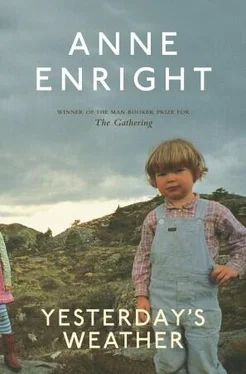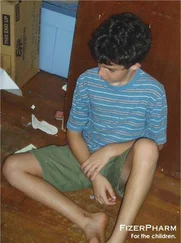It is familiar to us all. At least, it was familiar to me, the first time I walked in, because all my dreams were there, and there were plenty of cracks in the wall.
The first time I didn’t sleep with the architect was purely social. We were at a party to celebrate a friend’s new extension. There had been connections, before that, of course, we were both part of the same set. If I ever wanted an extension, I would have come to him myself.
I asked him about terracotta tiling and we discussed the word ‘grout’. I was annoyed by the faint amusement in his face when I said that white was the only colour for a bathroom sink. ‘I am the perfect Architect,’ he said, ‘I have no personal taste. I only look amused to please my clients, who expect to be in the wrong.’ There was a mild regret in his voice for all the cathedrals he should have built and we talked about that for a while.
The second time I didn’t sleep with the architect was in my own house. I shouldn’t have invited him, but the guilt was very strong. I wanted him to meet my husband and go away quietly, but he spent the time pacing the room, testing the slope of the floor. He knocked on the walls too, to see which were partitions; he sniffed slightly in front of my favourite picture and told me the bedroom was a mistake. ‘I know what you mean,’ I said, and then backed away. I said that I could live in a hole at the side of the road, so long as it was warm. ‘Do you ever think of anything,’ I asked, ‘except dry rot?’ We were perfectly at home with one another. Even so, there were many occasions in that first year when we did not make love.
The reasons for this neglect were profound, and not to be confused with an absence of desire. The architect and I had both built our lives with much deliberation. The need to abandon everything, to ‘let it come down’ had been mislaid long ago. We understood risk too well. We needed it too much. There was also the small matter of my husband and a child.
It is a quiet child with red hair. It is past the boring stage and runs around from room to room, taking up my time. It would be a mistake to say that I loved her. I am that child. When she looks at me I feel vicious, the need between us is so complete, and I feel vicious for the world, because it threatens the head that I love. On the other hand, wives that are faithful to their husbands because they are infatuated by their offspring don’t make sense to me. One doesn’t have sex with one’s children.
I am unfaithful with my husband’s money — a much more pleasing betrayal. My life is awash with plumbers and electricians, and I change all the ashtrays twice a year. I watch women in fitting rooms, the way they stick their lips out and make them ugly when they look into the mirror. I wonder who they are dressing for and I wonder who pays.
My husband earns forty thousand pounds a year and has a company car. This is one of the first things he ever told me. But I fell in love with him anyway.
After I hadn’t slept with the architect a few times, I took to riding buses as though they were the subways of New York. I sighed when the air-brakes loosened their sad load, and sat at the front, up-top, where I could drive with no hands. I became addicted to escalators, like a woman in a nervous breakdown. Stairs were for sitting on, with my child in my lap. I joined the local library for that purpose.
These were all things I dreamed about long before I met the architect, which makes this story dishonest in its way. Under excuses for sitting on library steps I could also list: simple fatigue, not winning the lottery, not liking the colour blue. Under excuses for getting rid of a baby I could list: not liking babies, not liking myself, or not liking the architect. Take your pick.
I don’t mean to sound cold. These are things I have to say slowly, things I have to pace the room for, testing the slope in the floor. So. The architect is called Paul, if you must know. His parents called him Paul because they were the kind of people who couldn’t decide on the right wallpaper. Paul has a mind as big as a house, a heart the size of a door and a dick you could hang your hat on. He never married; being too choosy, too hesitant, too mindful of the importance of things.
I wanted to function in and around his breakfast. I wanted to feel panic and weight. There was the usual thing about his smell, and where I wanted that. (I felt his body hard against me. His eyes opened so slowly, I thought he was in pain. ‘Oh Sylvia,’ his breath was a whisper, a promise against my skin. The green flame of his eye licked my mouth, my neck, my breast.) But I’m sounding cold again. The architect’s smell would have spiralled out from me to fill uncountable cubic feet. I loved him.
Not sleeping with the architect helped my marriage quite a bit. I discovered all kinds of corners in my husband, and little gardens in his head. I was immensely aware of how valuable he was as a human being, the presence he held in a room, the goodness with which he had given me his life, his salary and his company car. I was grateful for the fact that he still kissed for hours, as though the cycle of our sex lives was not complete. (Sex with my architect would have been horribly frank, nothing to say and nothing to hide.)
My husband came in to breakfast one morning, and his hands were shaking. He said ‘Look what I have done.’ He was holding a letter that he had picked up in the hall. ‘I tore it up,’ he said. ‘It was for you, I’m sorry.’ He was very bewildered.
If it was wartime, we could have clung to each other and burnt the furniture, we could have deceived the enemy with underground tunnels and built bombs out of sugar. As it was, I rode the buses and he worked and we loved each other well enough.
The idea of the house grew into our marriage. I don’t know who suggested it in the end, but I rang Paul and said ‘Aidan wants you to think about some plans. We want to build. Yes at last. Isn’t it exciting?’ and my voice echoed down the phone.
I needed this house to contain, to live in his love. It would be difficult of course. There would be a lot of meetings with the door ajar, talking about damp-courses. The arguments over where the walls should be would mean too much. I would listen to the architect’s big mind and his big heart and look at his shoes. His voice would ache and retract. The green flame of his eye would lick me quite a bit. All the same, I would not fling my life into his life and say that he owed me something (which he did; which he knew), calls for responsibility being impolite these days, even with parents who gave birth and bled and all the rest. Besides, all he owed me was a fuck and whatever that implied. I had not slept with the architect seventeen times, incidentally.
I chose the site, a green field as near to a cliff as I could find — something for the house to jump off. We would take risks. From the front it would look like a cottage, but the back would fall downhill, with returns and surprises inside.
Of course he was good at his job. The place rose like an exhalation. The foundations were dug, the bones set, and a skin of brick grew around the rest. It was wired and plastered and plumbed. Much like myself, the first time I slept with the architect.
It was in the finished house. We were walking the empty shell, making plans to fill it in. I was joking most of the time. There would be no banisters on the stairs. The downstairs toilet, I said, should be in Weimar Brown and Gun Metal Grey, with a huge lever set in the floor for the flush. The bathroom proper would have an inside membrane of glass filled with water and fish. The master bedroom would be a deep electric blue, with ‘LOVE’ like a neon sign hung over the door. Trompe-l’æil for the dining room, even though it was no longer the rage, forests and animals, built out of food. I would coat the study walls with dark brown leather and put a cow grazing on the ceiling.
Читать дальше












